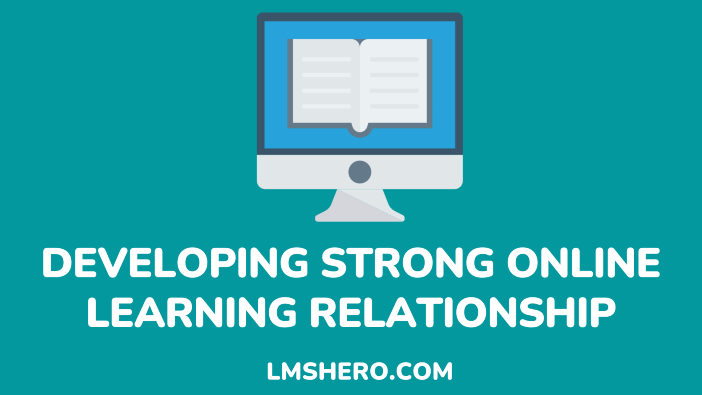Unlike before, learning online is now prevalent. The Educational system has adopted online learning in order to curb the spread of COVID-19. Which brings physical contact to its barest minimum. With that, teachers are faced with important questions, such as;
How best can you communicate with your students when they are not physically present with you?
How do you know when to help your students, when they are finding it hard to understand what you are explaining?
When teachers begin to build a strong academic relationship with students in the online learning environment, it becomes easier to give answers to these questions.
You need to be familiar with your students. Build a personal connection and make them comfortable in order for you to be aware of their engagement and how well they understand what you taught them.
In this article, I’ll be explaining to you practical ways to help you build a strong academic relationship with your students online.
1. A Sense Of Belonging
To achieve successful online schooling or learning, there is a need for healthy and quality communication. Which is vital for you to build a relationship with all your students.
On the other hand, in what way can a teacher make an online environment comfortable for students to feel like they belong and are accepted?
It is essential to create an avenue where teachers and students are able to introduce themselves.

While introducing yourself to your students, you should also bear in mind the Federal Educational Rights and Privacy Acts (FERPA). This regulation should guide you to ask your students for the appropriate directory information.
Here are simple questions you can ask your students:
- Where do you come from?
- What is your educational/occupational background?
- Is there personal information you’ll like to share (provided the student wants to share)?
The goal of these questions is to find common ground and areas of mutual interest. You can start developing a relationship with an area of mutual or common interest.
Ask your students questions related to their answers to follow up. Just make sure you show interest in everything your student tells you, which includes where they are from and the work they do.
This strategy helps students relax and feel free to share their information with you and their other colleagues in the class.
2. Student Participation
For the continuous development of a strong online learning relationship with your students, participation in class is important. It is not unusual to see students who are present in an online class but are uninterested in learning.
Many factors can serve as a distraction for students while learning online, which includes; Being active on social media through their phones, being involved in other activities, or watching something else. As a teacher or instructor, make sure you engage your students in the class.

You can engage your students by:
- Asking your students to answer questions
- Making sure they participate in polls
- Asking for their opinion on a discussion.
The way you respond to your student plays a major role in building a strong relationship with your students in an online setting.
Students begin to recognize that there is little or no difference between online learning and physical or in-person learning when they are aware that you listen or pay attention to what they say, and you carefully read or go through their work.
Once students feel that their work or what they have to say is valuable, there is an improvement in the quality of their work and how they communicate.
3. Give Consistent Feedback
When there is a consistent level of positive feedback, a strong relationship is easily built and established between teachers and students.
When students give their teachers feedback in form of email, survey, evaluation, and classroom discussions, it helps the teacher improve on course content and how to teach the students better.
Also, when students get feedback from their teachers through email, classroom discussion, corrections, or comments on assignments, the students are able to improve on areas necessary and perform better.
Teachers who are proactive and genuinely interested in their students give their students constructive feedback, especially students who are struggling to perform well, the feedback serves as an avenue to perform excellently.
4. Show Respect
Building a strong relationship requires work and effort from both the student and the teacher. It is not something that just happens, rather a strong relationship is established with intentionality.
Respect is reciprocal.
As a teacher, if your students show you respect, it is expected that respect should be reciprocated. They should also be handled with respect.

This is one thing that we often overlook in an online setting. But in the actual sense, respect is a common courtesy that we should always practice.
Showing respect in an online class can be that instead of speaking and interrupting your colleagues while they are having a discussion, writing an assignment, or making use of slang or colloquial language in the classroom(online), you use the “raise hand” option.
Also, for a teacher or student to know the kind of situation to discuss in an online class discussion group or a private message, is a matter of respect.
When there is a clear definition/outline of these terms and you are able to create an atmosphere of respect, it will be easy for students to trust you and that you interact with them because you have their best interest at heart.
In order to build a firm and strong relationship with your students, respect is important.
Result of Building a Strong Online Relationship
Building a strong relationship with students in an online school is essential. You should communicate with the students often, make them feel welcome, valued, and heard, and give constructive criticism and positive feedback.

To be able to achieve productive, effective, and beneficial online learning, it is essential that you build a strong academic relationship.
Conclusion
Do not forget to be kind to your students.
Have reasonable expectations because everyone is trying to adjust to the new-normal(online learning).
At the same time, you should be kind to yourself; don’t overwork yourself, set work hours, and establish flexible times for teaching, responding to your students, and grading.
Remember, exciting and productive online learning is a product of a happy student and vice versa.
If you find this article helpful, check here for more relevant content.







